Memoir of John Shakespear Bartley, 1916-1919 - Part 21
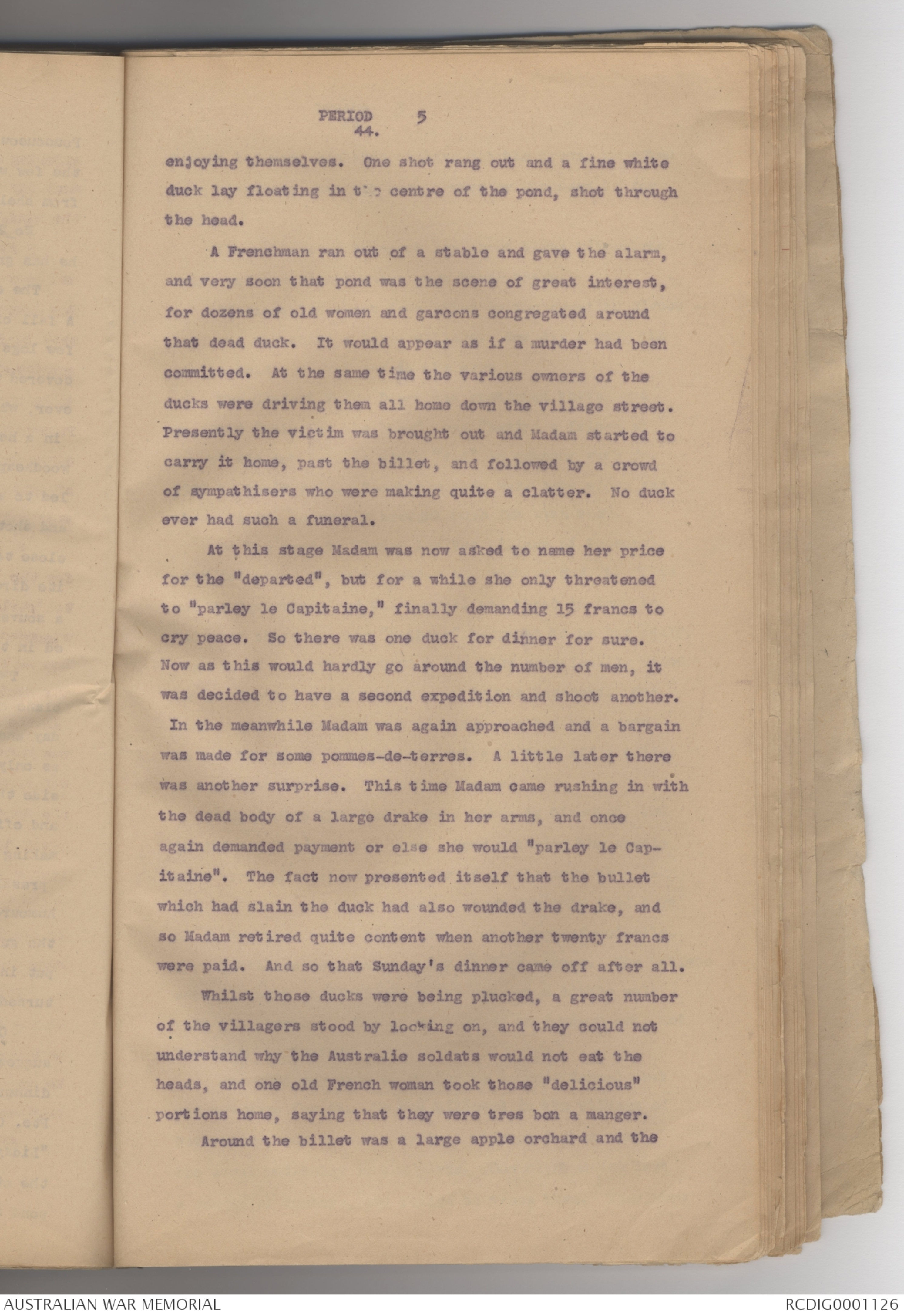
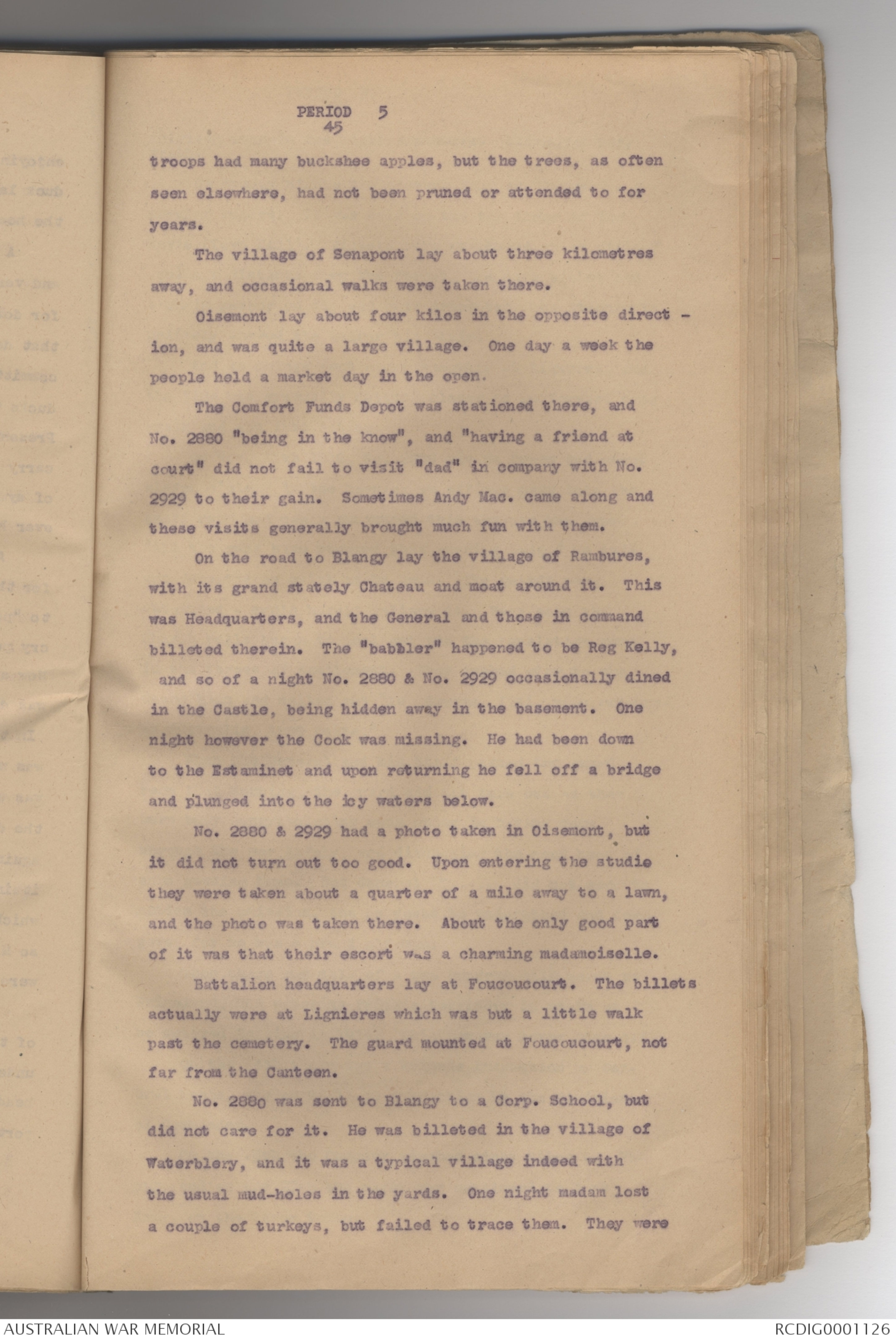
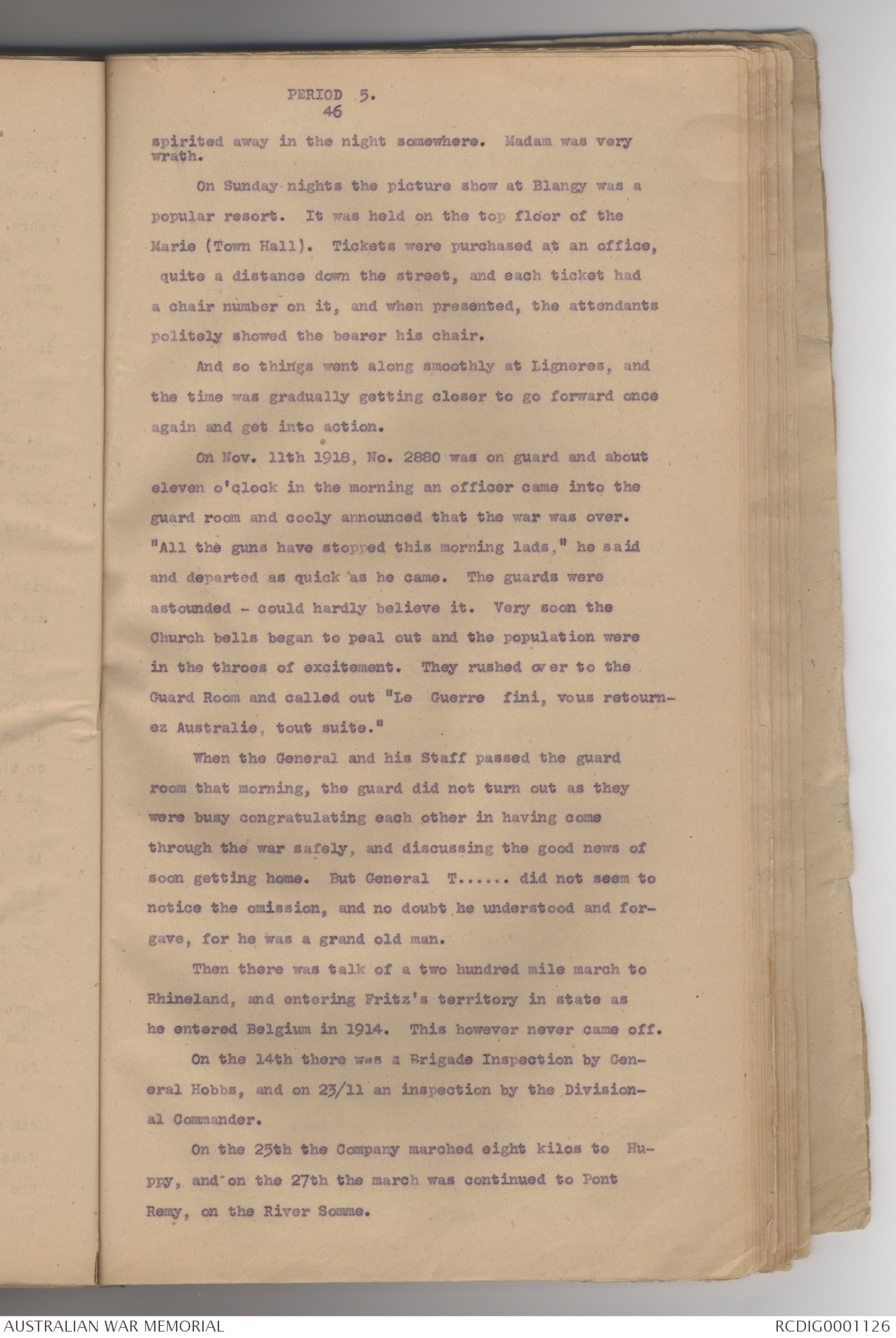
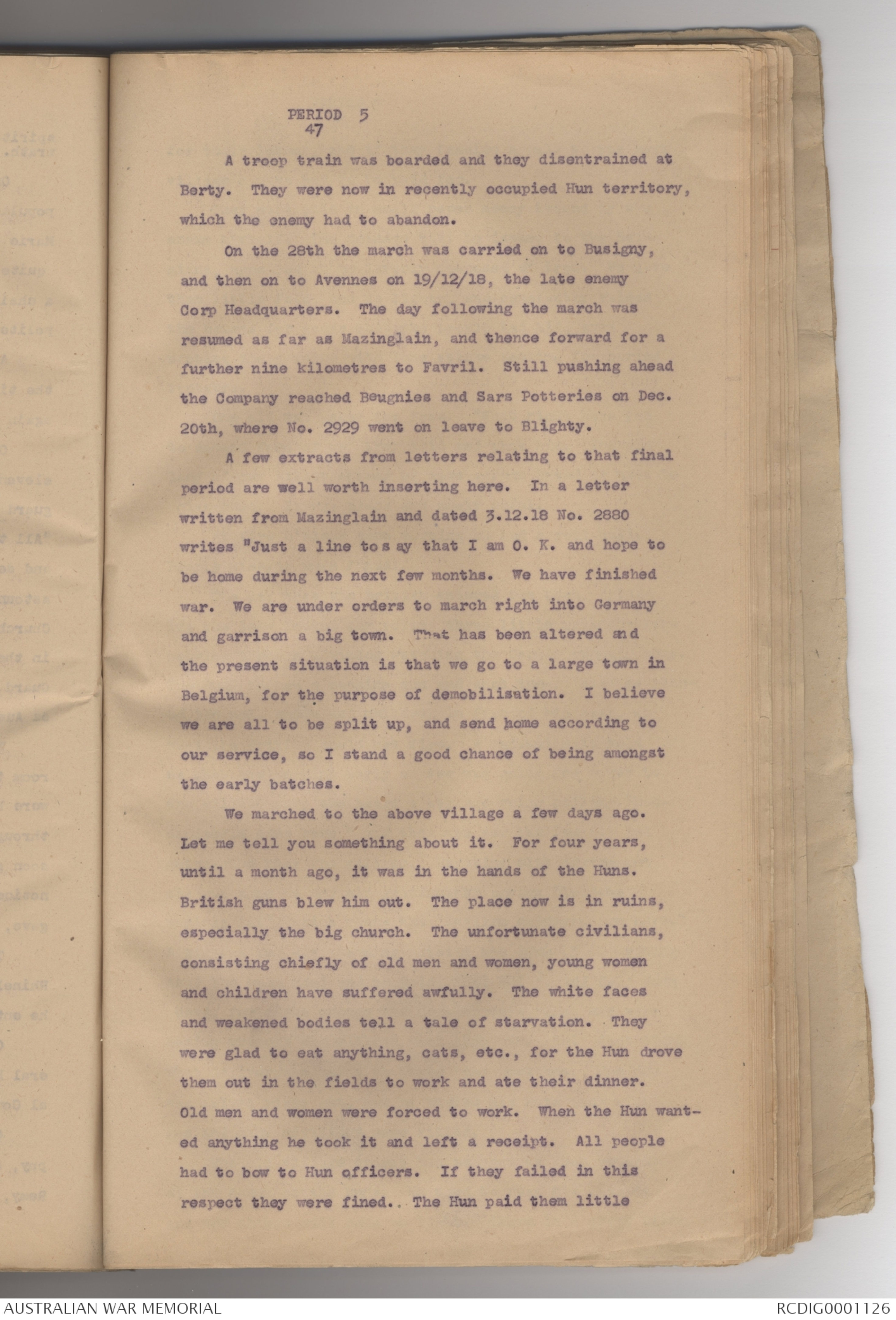
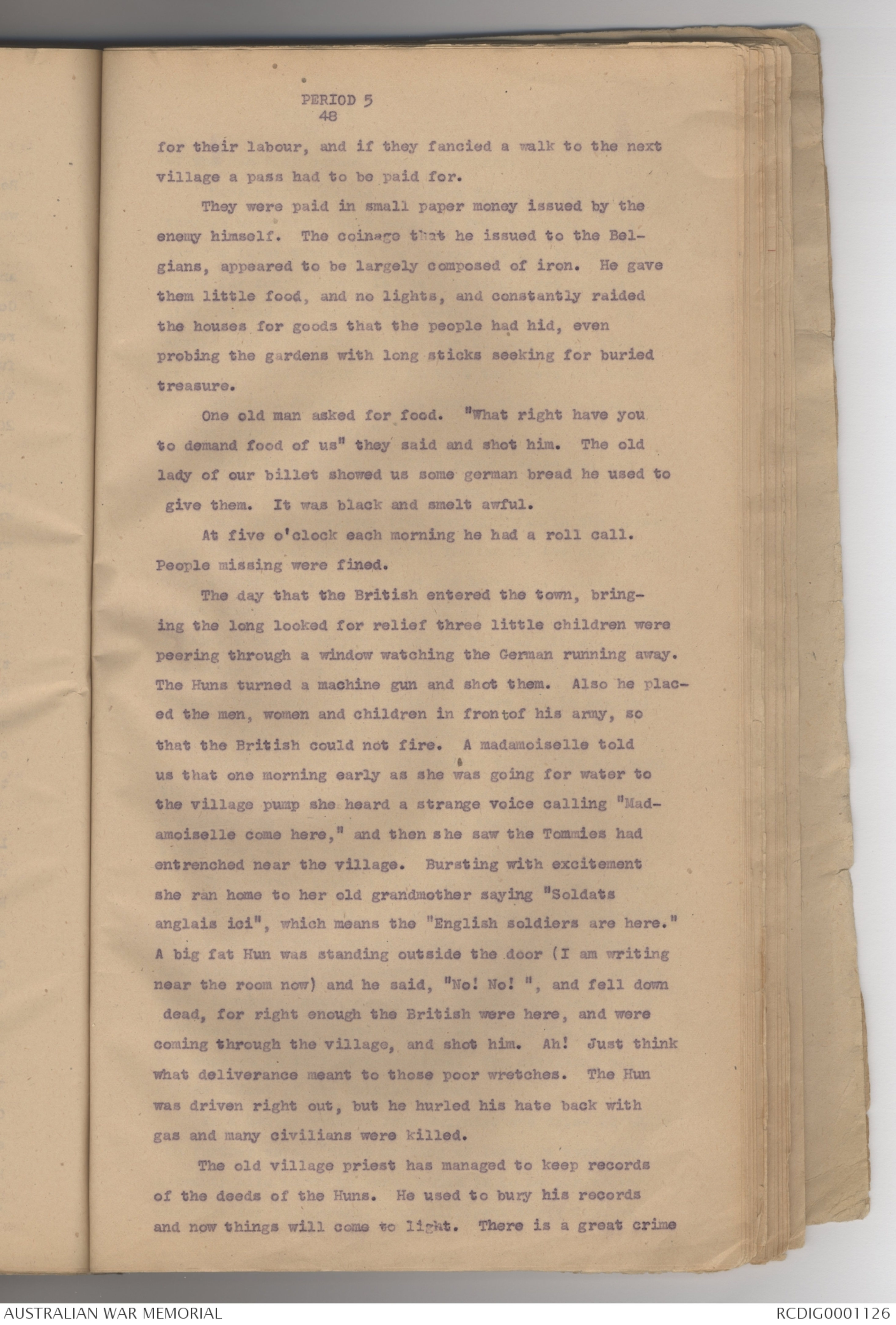
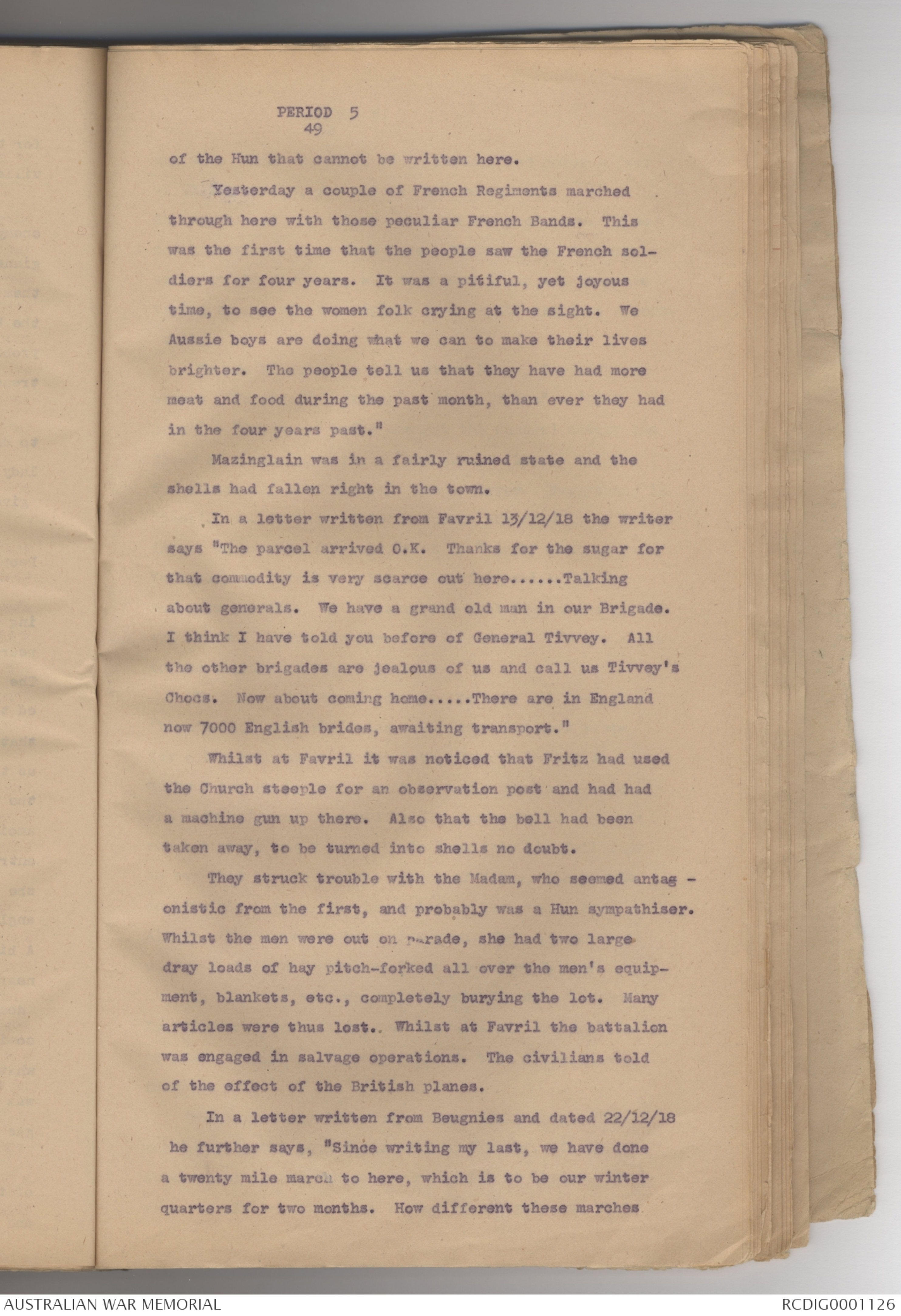
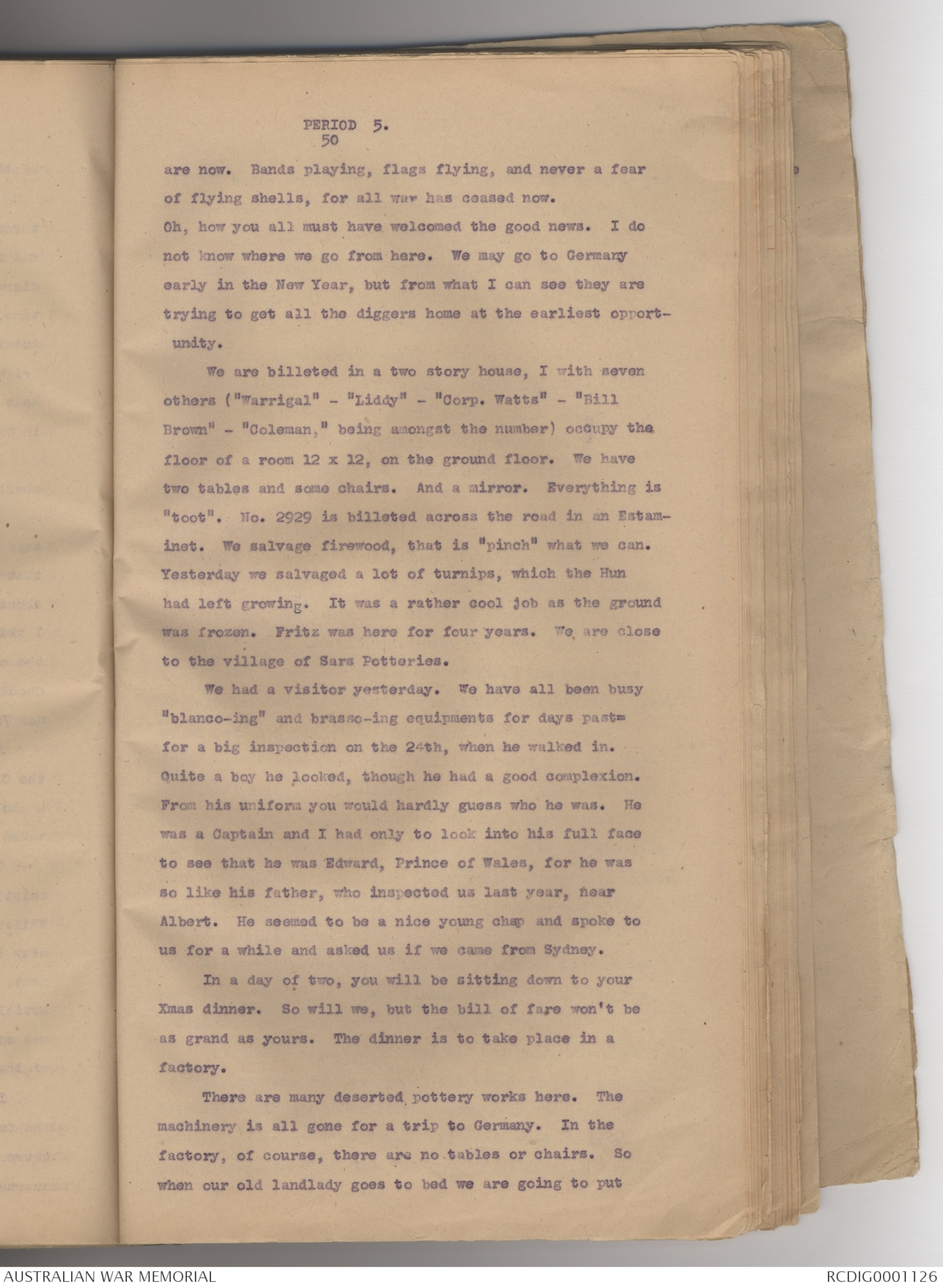
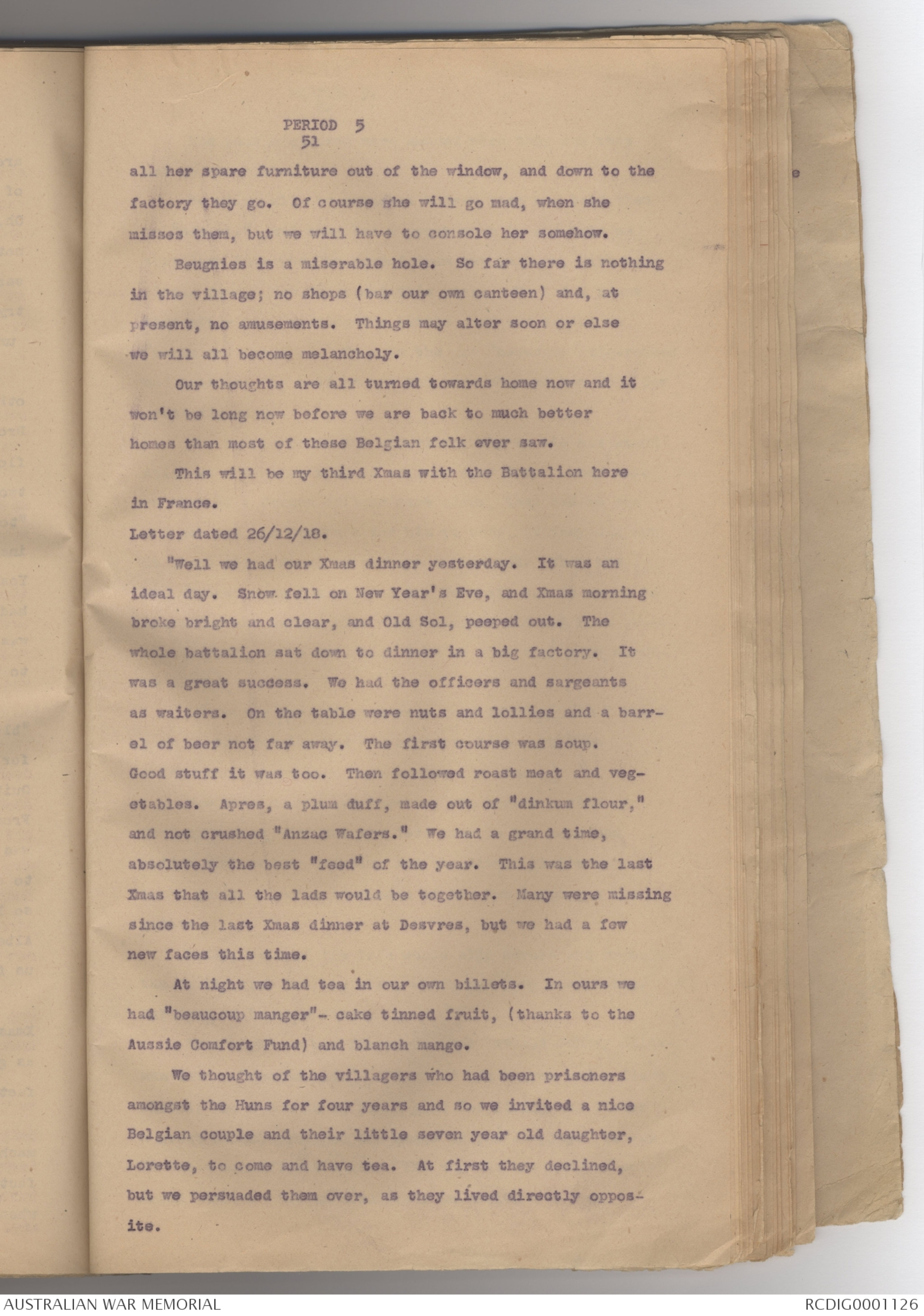
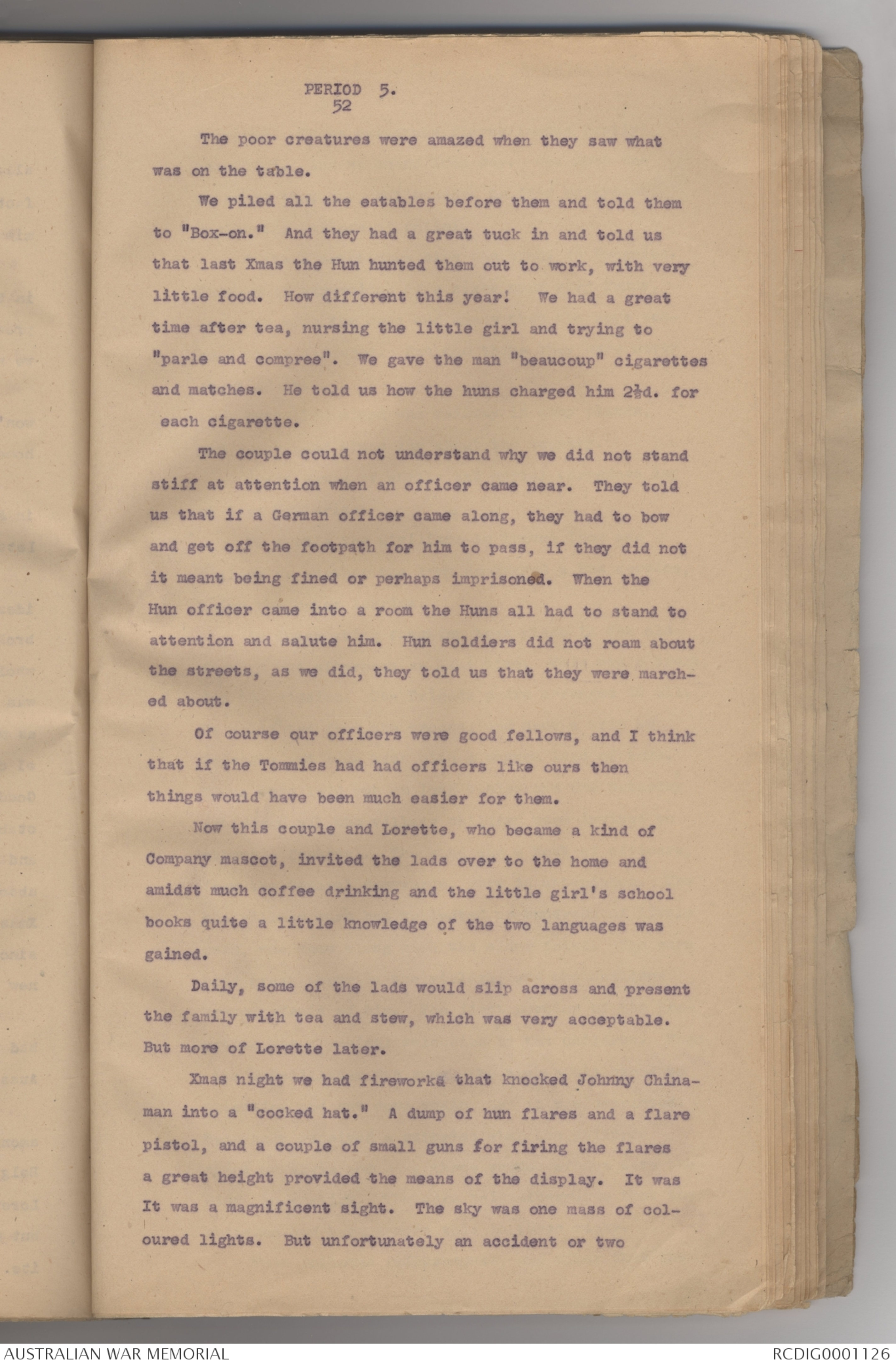
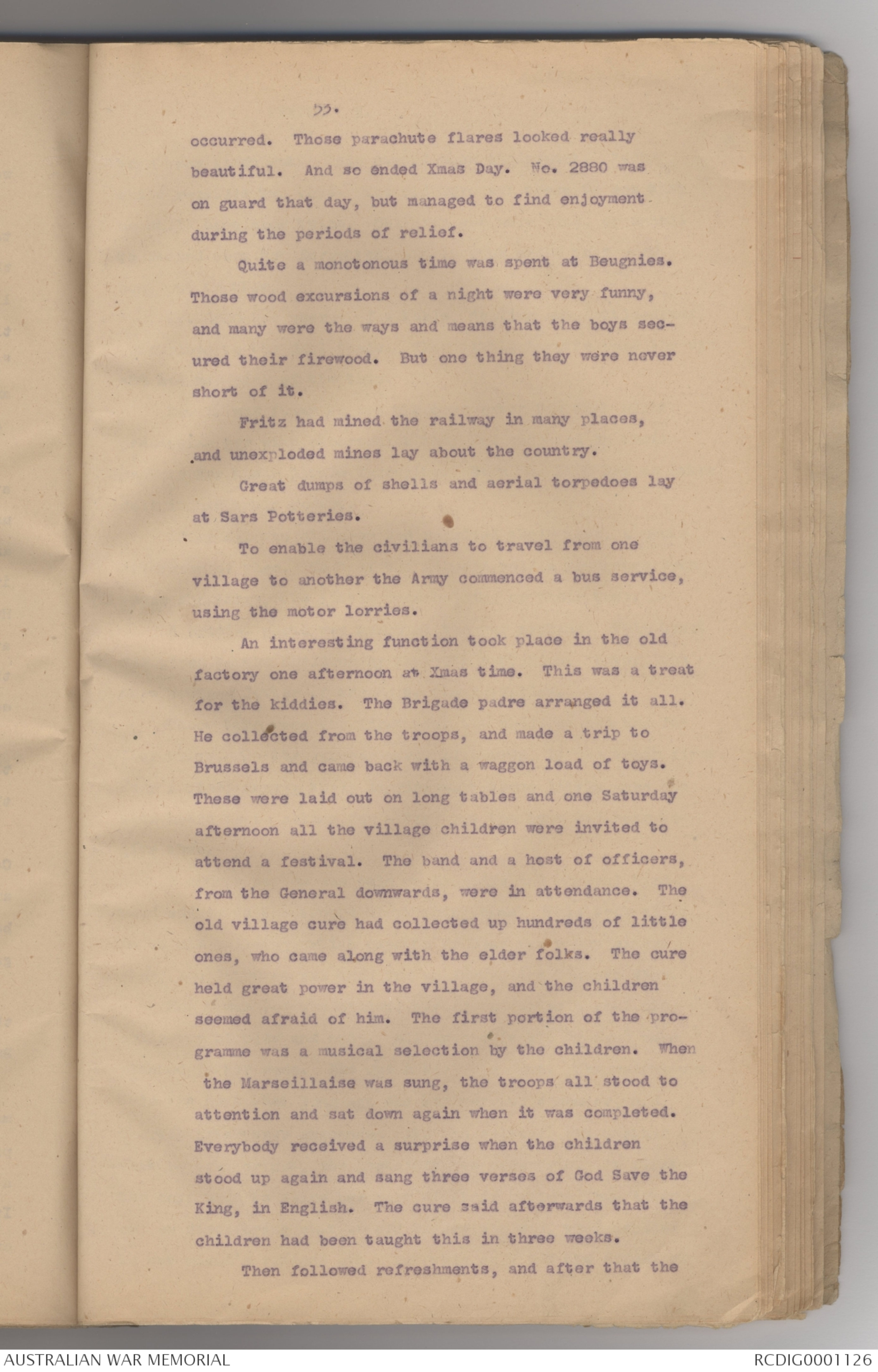
PERIOD 5
44.
enjoying themselves. One shot rang out and a fine white
duck lay floating in the centre of the pond, shot through
the head.
A Frenchman ran out of a stable and gave the alarm,
and very soon that pond was the scene of great interest,
for dozens of old women and garcons congregated around
that dead duck. It would appear as if a murder had been
committed. At the same time the various owners of the
ducks were driving them all home down the village street.
Presently the victim was brought out and Madam started to
carry it home, past the billet, and followed by a crowd
of sympathisers who were making quite a clatter. No duck
ever had such a funeral.
At this stage Madam was now asked to name her price
for the "departed", but for a while she only threatened
to "parley le Capitaine," finally demanding 15 francs to
cry peace. So there was one duck for dinner for sure.
Now as this would hardly go around the number of men, it
was decided to have a second expedition and shoot another.
In the meanwhile Madam was again approached and a bargain
was made for some pommes-de-terres. A little later there
was another surprise. This time Madam came rushing in with
the dead body of a large drake in her arms, and once
again demanded payment or else she would "parley le Capitaine".
The fact now presented itself that the bullet
which had slain the duck had also wounded the drake, and
so Madam retired quite content when another twenty francs
were paid. And so that Sunday's dinner came off after all.
Whilst those ducks were being plucked, a great number
of the villagers stood by looking on, and they could not
understand why the Australie soldats would not eat the
heads, and one old French woman took those "delicious'
portions home, saying that they were tres bon a manger.
Around the billet was a large apple orchard and the
PERIOD 5
45
troops had many buckshee apples, but the trees, as often
seen elsewhere, had not been pruned or attended to for
years.
The village of Senapont lay about three kilometres
away, and occasional walks were taken there.
Oisemont lay about four kilos in the opposite direction,
and was quite a large village. One day a week the
people held a market day in the open.
The Comfort Funds Depot was stationed there, and
No. 2880 "being in the know", and "having a friend at
court" did not fail to visit "dad' in company with No.
2929 to their gain. Sometimes Andy Mac. came along and
these visits generally brought much fun with them.
On the road to Blangy lay the village of Rambures,
with its grand stately Chateau and moat around it. This
was Headquarters, and the General and those in command
billeted therein. The "babbler" happened to be Reg Kelly,
and so of a night No. 2880 & No. 2929 occasionally dined
in the Castle, being hidden away in the basement. One
night however the Cook was missing. He had been down
to the Estaminet and upon returning he fell off a bridge
and plunged into the icy waters below.
No. 2800 & 2929 had a photo taken in Oisemont, but
it did not turn out too good. Upon entering the studio
they were taken about a quarter of a mile away to a lawn,
and the photo was taken there. About the only good part
of it was that their escort was a charming madamoiselle.
Battalion headquarters lay at Foucoucourt. The billets
actually were at Lignieres which was but a little walk
past the cemetery. The guard mounted at Foucoucourt, not
far from the Canteen.
No. 2880 was sent to Blangy to a Corp. School, but
did not care for it. He was billeted in the village of
Waterblery, and it was a typical village indeed with
the usual mud-holes in the yards. One night madam lost
a couple of turkeys, but failed to trace them. They were
PERIOD 5.
46
spirited away in the night somewhere. Madam was very
wrath.
On Sunday nights the picture show at Blangy was a
popular resort. It was held on the top floor of the
Marie (Town Hall). Tickets were purchased at an office,
quite a distance down the street, and each ticket had
a chair number on it, and when presented, the attendants
politely showed the bearer his chair.
And so things went along smoothly at Ligneres, and
the time was gradually getting closer to go forward once
again and get into action.
On Nov. 11th 1918, No. 2880 was on guard and about
eleven o'clock in the morning an officer came into the
guard room and cooly announced that the war was over.
"All the guns have stopped this morning lads," he said
and departed as quick as he came. The guards were
astounded - could hardly believe it. Very soon the
Church bells began to peal out and the population were
in the throes of excitement. They rushed over to the
Guard Room and called out "Le Guerre fini, vous retournez
Australie, tout suite."
When the General and his Staff passed the guard
room that morning, the guard did not turn out as they
were busy congratulating each other in having come
through the war safely, and discussing the good news of
soon getting home. But General T...... did not seem to
notice the omission, and no doubt he understood and forgave,
for he was a grand old man.
Then there was talk of a two hundred mile march to
Rhineland, and entering Fritz's territory in state as
he entered Belgium in 1914. This however never came off.
On the 14th there was a Brigade Inspection by General
Hobbs, and on 23/11 an inspection by the Divisional
Commander.
On the 25th the Company marched eight kilos to Huppy,
and on the 27th the march was continued to Pont
Remy, on the River Somme.
PERIOD 5
47
A troop train was boarded and they disentrained at
Berty. They were now in recently occupied Hun territory,
which the enemy had to abandon.
On the 28th the march was carried on to Busigny,
and then on to Avennes on 19/12/18, the late enemy
Corp Headquarters. The day following the march was
resumed as far as Mazinglain, and thence forward for a
further nine kilometres to Favril. Still pushing ahead
the Company reached Beugnies and Sars Potteries on Dec.
20th, where No. 2929 went on leave to Blighty.
A few extracts from letters relating to that final
period are well worth inserting here. In a letter
written from Mazinglain and dated 3.12.18 No. 2880
writes "Just a line to s ay that I am O. K. and hope to
be home during the next few months. We have finished
war. We are under orders to march right into Germany
and garrison a big town. That has been altered and
the present situation is that we go to a large town in
Belgium, for the purpose of demobilisation. I believe
we are all to be split up, and send home according to
our service, so I stand a good chance of being amongst
the early batches.
We marched to the above village a few days ago.
Let me tell you something about it. For four years,
until a month ago, it was in the hands of the Huns.
British guns blew him out. The place now is in ruins,
especially the big church. The unfortunate civilians,
consisting chiefly of old men and women, young women
and children have suffered awfully. The white faces
and weakened bodies tell a tale of starvation. They
were glad to eat anything, cats, etc., for the Hun drove
them out in the fields to work and ate their dinner.
Old men and women were forced to work. When the Hun wanted
anything he took it and left a receipt. All people
had to bow to Hun officers. If they failed in this
respect they were fined.. The Hun paid them little
PERIOD 5
48
for their labour, and if they fancied a walk to the next
village a pass had to be paid for.
They were paid in small paper money issued by the
enemy himself. The coinage that he issued to the Belgians,
appeared to be largely composed of iron. He gave
them little food, and no lights, and constantly raided
the houses for goods that the people had hid, even
probing the gardens with long sticks seeking for buried
treasure.
One old man asked for food. "What right have you
to demand food of us" they said and shot him. The old
lady of our billet showed us some german bread he used to
give them. It was black and smelt awful.
At five o'clock each morning he had a roll call.
People missing were fined.
The day that the British entered the town, bringing
the long looked for relief three little children were
peering through a window watching the German running away.
The Huns turned a machine gun and shot them. Also he placed
the men, women and children in front of his army, so
that the British could not fire. A madamoiselle told
us that one morning early as she was going for water to
the village pump she heard a strange voice calling "Madamoiselle
come here," and then she saw the Tommies had
entrenched near the village. Bursting with excitement
she ran home to her old grandmother saying "Soldats
anglais ici", which means the "English soldiers are here."
A big fat Hun was standing outside the door (I am writing
near the room now) and he said, "No! No!", and fell down
dead, for right enough the British were here, and were
coming through the village, and shot him. Ah! Just think
what deliverance meant to those poor wretches. The Hun
was driven right out, but he hurled his hate back with
gas and many civilians were killed.
The old village priest has managed to keep records
of the deeds of the Huns. He used to bury his records
and now things will come to light. There is a great crime
PERIOD 5
49
of the Hun that cannot be written here.
Yesterday a couple of French Regiments marched
through here with those peculiar French Bands. This
was the first time that the people saw the French soldiers
for four years. It was a pitiful, yet joyous
time, to see the women folk crying at the sight. We
Aussie boys are doing what we can to make their lives
brighter. The people tell us that they have had more
meat and food during the past month, than ever they had
in the four years past."
Mazinglain was in a fairly ruined state and the
shells had fallen right in the town.
In a letter written from Favril 13/12/18 the writer
says "The parcel arrived O.K. Thanks for the sugar for
that commodity is very scarce out here......Talking
about generals. We have a grand old man in our Brigade.
I think I have told you before of General Tivvey. All
the other brigades are jealous of us and call us Tivvey's
Chocs. Now about coming home.....There are in England
now 7000 English brides, awaiting transport."
Whilst at Favril it was noticed that Fritz had used
the Church steeple for an observation post and had had
a machine gun up there. Also that the bell had been
taken away, to be turned into shells no doubt.
They struck trouble with the Madam, who seemed antagonistic
from the first, and probably was a Hun sympathiser.
Whilst the men were out on parade, she had two large
dray loads of hay pitch-forked all over tho men's equipment,
blankets, etc., completely burying the lot. Many
articles were thus lost. Whilst at Favril the battalion
was engaged in salvage operations. The civilians told
of the effect of the British planes.
In a letter written from Beugnies and dated 22/12/18
he further says, "Since writing my last, we have done
a twenty mile march to here, which is to be our winter
quarters for two months. How different these marches
PERIOD 5.
50
are now. Bands playing, flags flying, and never a fear
of flying shells, for all war has ceased now.
Oh, how you all must have welcomed the good news. I do
not know where we go from here. We may go to Germany
early in the New Year, but from what I can see they are
trying to get all the diggers home at the earliest opportunity.
We are billeted in a two story house, I with seven
others ("Warrigal" - "Liddy" - "Corp. Watts" - "Bill
Brown" - "Coleman," being amongst the number) occupy the
floor of a room 12 x 12, on the ground floor. We have
two tables and some chairs. And a mirror. Everything is
"toot". No. 2929 is billeted across the road in an Estaminet.
We salvage firewood, that is "pinch" what we can.
Yesterday we salvaged a lot of turnips, which the Hun
had left growing. It was a rather cool job as the ground
was frozen. Fritz was here for four years. We are close
to the village of Sars Potteries.
We had a visitor yesterday. We have all been busy
"blanco-ing" and brasso-ing equipments for days past=
for a big inspection on the 24th, when he walked in.
Quite a boy he looked, though he had a good complexion.
From his uniform you would hardly guess who he was. He
was a Captain and I had only to look into his full face
to see that he was Edward, Prince of Wales, for he was
so like his father, who inspected us last year, near
Albert. He seemed to be a nice young chap and spoke to
us for a while and asked us if we came from Sydney.
In a day of two, you will be sitting down to your
Xmas dinner. So will we, but the bill of fare won't be
as grand as yours. The dinner is to take place in a
factory.
There are many deserted pottery works here. The
machinery is all gone for a trip to Germany. In the
factory, of course, there are no tables or chairs. So
when our old landlady goes to bed we are going to put
PERIOD 5
51
all her spare furniture out of the window, and down to the
factory they go. Of course she will go mad, when she
misses them, but we will have to console her somehow.
Beugnies is a miserable hole. So far there is nothing
in the village; no shops (bar our own canteen) and, at
present, no amusements. Things may alter soon or else
we will all become melancholy.
Our thoughts are all turned towards home now and it
won't be long now before we are back to much better
homes than most of these Belgian folk ever saw.
This will be my third Xmas with the Battalion here
in France.
Letter dated 26/12/18.
"Well we had our Xmas dinner yesterday. It was an
ideal day. Snow fell on New Year's Eve, and Xmas morning
broke bright and clear, and Old Sol, peeped out. The
whole battalion sat down to dinner in a big factory. It
was a great success. We had the officers and sargeants
as waiters. On the table were nuts and lollies and a barrel
of beer not far away. The first course was soup.
Good stuff it was too. Then followed roast meat and vegetables.
Apres, a plum duff, made out of "dinkum flour,"
and not crushed "Anzac Wafers." We had a grand time,
absolutely the best "feed" of the year. This was the last
Xmas that all the lads would be together. Many were missing
since the last Xmas dinner at Desvres, but we had a few
new faces this time.
At night we had tea in our own billets. In ours we
had "beaucoup manger"- cake tinned fruit, (thanks to the
Aussie Comfort Fund) and blanch mange.
We thought of the villagers who had been prisoners
amongst the Huns for four years and so we invited a nice
Belgian couple and their little seven year old daughter,
Lorette, to come and have tea. At first they declined,
but we persuaded them over, as they lived directly opposite.
PERIOD 5.
52
The poor creatures were amazed when they saw what
was on the table.
We piled all the eatables before them and told them
to "Box-on." And they had a great tuck in and told us
that last Xmas the Hun hunted them out to work, with very
little food. How different this year! We had a great
time after tea, nursing the little girl and trying to
"parle and compree". We gave the man "beaucoup" cigarettes
and matches. He told us how the huns charged him 2½d. for
each cigarette.
The couple could not understand why we did not stand
stiff at attention when an officer came near. They told
us that if a German officer came along, they had to bow
and get off the footpath for him to pass, if they did not
it meant being fined or perhaps imprisoned. When the
Hun officer came into a room the Huns all had to stand to
attention and salute him. Hun soldiers did not roam about
the streets, as we did, they told us that they were marched
about.
Of course our officers were good fellows, and I think
that if the Tommies had had officers like ours then
things would have been much easier for them.
Now this couple and Lorette, who became a kind of
Company mascot, invited the lads over to the home and
amidst much coffee drinking and the little girl's school
books quite a little knowledge of the two languages was
gained.
Daily, some of the lads would slip across and present
the family with tea and stew, which was very acceptable.
But more of Lorette later.
Xmas night we had fireworks that knocked Johnny Chinaman
into a "cocked hat." A dump of hun flares and a flare
pistol, and a couple of small guns for firing the flares
a great height provided the means of the display. It was
It was a magnificent sight. The sky was one mass of coloured
lights. But unfortunately an accident or two
53.
occurred. Those parachute flares looked really
beautiful. And so ended Xmas Day. No. 2880 was
on guard that day, but managed to find enjoyment.
during the periods of relief.
Quite a monotonous time was spent at Beugnies.
Those wood excursions of a night were very funny,
and many were the ways and means that the boys secured
their firewood. But one thing they were never
short of it.
Fritz had mined the railway in many places,
and unexploded mines lay about the country.
Great dumps of shells and aerial torpedoes lay
at Sars Potteries.
To enable the civilians to travel from one
village to another the Army commenced a bus service,
using the motor lorries.
An interesting function took place in the old
factory one afternoon at Xmas time. This was a treat
for the kiddies. The Brigade padre arranged it all.
He collected from the troops, and made a trip to
Brussels and came back with a waggon load of toys.
These were laid out on long tables and one Saturday
afternoon all the village children were invited to
attend a festival. The band and a host of officers,
from the General downwards, were in attendance. The
old village cure had collected up hundreds of little
ones, who came along with the elder folks. The cure
held great power in the village, and the children
seemed afraid of him. The first portion of the programme
was a musical selection by the children. When
the Marseillaise was sung, the troops all stood to
attention and sat down again when it was completed.
Everybody received a surprise when the children
stood up again and sang three verses of God Save the
King, in English. The cure said afterwards that the
children had been taught this in three weeks.
Then followed refreshments, and after that the
 Kate Benn
Kate BennThis transcription item is now locked to you for editing. To release the lock either Save your changes or Cancel.
This lock will be automatically released after 60 minutes of inactivity.